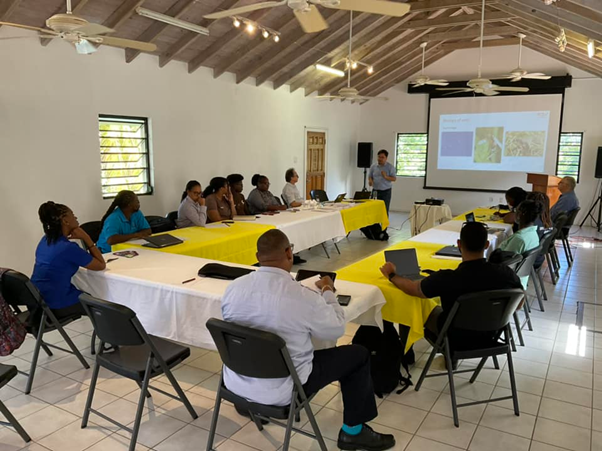Noel Tawatao, an ant specialist from Fera Science, visited Montserrat in the Caribbean in April 2023 to train biosecurity staff from five UK Overseas Territories (UKOTs) (Anguilla, British Virgin Islands, Cayman Islands, Montserrat and Turks and Caicos) how to identify ants, particularly invasive species. The training was made possible by the GB Non-Native Species Secretariat and the UKOT’s Biosecurity Initiative. In addition, Noel also conducted a short feasibility study on managing and understanding the negative impacts of invasive ants, particularly the three species of fire ants that are currently invading Montserrat: Solenopsis geminata (Tropical Fire Ant), Solenopsis invicta (Red Imported Fire Ant) and Wasmannia auropunctata (Electric/Little Fire Ant). These fire ants are known for their painful stings/bites and their ability to spread quickly, especially in open and disturbed areas. Their high population density, which is essential for immobilising prey, makes them successful in invading new areas and displacing other ant species.
Invasion by non-native ants can be ecologically disastrous, economically damaging and pose a threat to public health. The introduction of invasive ants results in a change to biogeographical patterns as well as a loss in biodiversity, especially in oceanic islands with few or no native ant species such as Montserrat. Among the three fire ants, Solenopsis invicta is the most aggressive and prevalent. This is because it is mostly found near human settlements and agricultural areas and can therefore affect people’s daily activities and agricultural production. Tackling its negative impact is now a priority task in Montserrat and extensive measures are being carried out. Eradicating the fire ants is impossible and even reducing their population density is a very challenging task as it requires significant financial support and complicated logistics.
Nonetheless, Noel and the staff from the Ministry of Agriculture, Housing, Land and the Environment in Montserrat have surveyed infestation sites and identified priority areas in an attempt to reduce their negative impact. Moreover, chemical controls using Insect Growth Regulators and direct mound treatment using different recommended active ingredients, and modified application techniques were conducted to reduce their population density, and negative impacts in priority areas.
A follow-up visit to assess the efficacy of the proposed controlling strategies is sought towards the end of this year. Physical control and proposed rehabilitation of some open and disturbed areas are also being considered as an alternative ecological and long-term approach to prevent further colonization of fire ants.
To learn more about the research and biosecurity support that Fera Science continues to provide for the UK Overseas Territories, you can visit the GB Non-native Species Secretariat (NNSS) website here. Or to find out more about the full breadth of our Crop Health diagnostics capability, you can click here to find out more.
Or alternatively, click here to visit our insect identification service.




